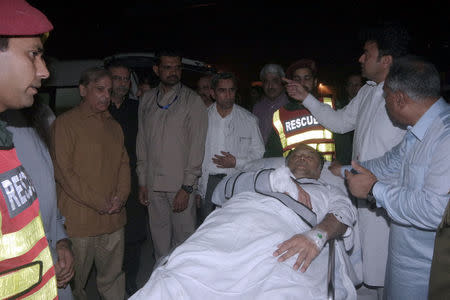Gun attack on minister deepens political divisions as Pakistan nears elections

By Saad Sayeed and Mubasher Bukhari
ISLAMABAD/KARACHI (Reuters) - An assassination attempt on a minister has deepened divisions ahead of Pakistan's elections, with an Islamist party denying involvement and an opposition figure blaming it on fiery rhetoric by the ousted premier.
A gunman shot interior minister Ahsan Iqbal, a senior member of the ruling Pakistan Muslim League-Nawaz (PML-N) and ally of ousted prime minister Nawaz Sharif, as he was leaving a constituency meeting in Punjab province late on Sunday.
Iqbal was recovering in hospital from a bullet wound on Monday.
Police have arrested the suspected shooter, describing him as a supporter of the new hardline Islamist party Tehreek-e-Labaik, but the party has disowned the man.
Sunday's attack heightened the sense of unease in the runup to the general election, expected by late July.
Leaders from Pakistan's main opposition parties all condemned the assassination attempt. But a prominent official of former cricket star Imran Khan's Pakistan Tehreek-e-Insaf (PTI) opposition party said Sharif had created the backdrop for the attack at large rallies protesting his removal by the Supreme Court last July.
"We condemn it with full force. But the political climate is being seriously affected by Nawaz's wild accusations against his opponents and creating tension and anger all over," said Khan's chief of staff, Naeem ul Haq.
"So if Nawaz [Sharif] continues to utter poison, such incidents will continue to occur."
Pakistan's Supreme Court disqualified Sharif as prime minister last July over a small source of unreported income and he is currently on trial before an anti-corruption court, though his party still holds a majority in parliament.
Sharif has denounced the court ruling as a conspiracy led by rival Khan, routinely gathering large crowds of his supporters to voice his grievances.
Sharif has portrayed Khan as a puppet of the powerful military establishment, which has a history of meddling in Pakistani politics. Khan denies colluding with the army and the military denies interfering in politics.
Preliminary reports suggested Sunday's attacker had links to a new Islamist political party that campaigns on enforcing the death penalty for blasphemy and replacing secular influence on government with strict sharia law.
Late on Monday, Naeem messaged Reuters with an additional statement, saying: "Religious bigotry is increasing and diluting our politics in a negative way."
ATTACKER 'SHOUTED PARTY SLOGAN'
The assassination attempt on Iqbal has stoked fears of a repeat of the pre-election violence by Islamists that blighted the last two polls, including in 2007 when former prime minister Benazir Bhutto was killed on the campaign trail.
In Sunday's attack, a senior Punjab police official who was present during the interrogation of the suspected shooter - named as Abid Hussain, 21 - told Reuters his statements provided "solid evidence" he was a supporter of the Labaik party but not of any contact with party leaders.
"A moment before the attack, he shouted the slogan 'Labaik, labaik ya Rasool!' (I am here, I am here, oh Prophet of God!), a trademark slogan of Labaik party," the police official said.
But the official added: "At the same time, he talks like a mentally challenged person."
During interrogation, the suspect said "his conscience told him" to attack Iqbal over Labaik's accusations that the ruling party had committed blasphemy, by trying to change election law in a way some said weakened an oath declaring Mohammad the last true prophet.
The Labaik party - who blockaded roads into Pakistan's capital, Islamabad, over the election law issue for three weeks in November - said it had no knowledge of the attacker.
"We have got nothing to do with him," Labaik spokesman Ejaz Ashrafi said on Monday. "We are unarmed. We are in an unarmed struggle. Those conspiring against Tehreek-e-Labaik will not succeed."
Labaik was born out of a protest movement supporting Mumtaz Qadri, a bodyguard of the governor of Punjab who gunned down his boss in 2011 over his call to relax Pakistan's draconian blasphemy laws.
Khadim Hussain Rizvi, the leader of the new party - which won about 8 percent of the vote in a recent by-election - has called Qadri a "hero" and campaign posters have declared "death to blasphemers".
A senior PML-N official, minister of state for interior affairs Talal Chaudhry, said on Monday police were investigating groups that may have influenced the attack.
"Such people, on an ideological level, are prepared by others," Chaudhry said.
(Additional reporting by Syed Raza Hasan in Karachi and Jibran Ahmed in Peshawar; writing by Saad Sayeed; editing by Kay Johnson and Andrew Roche)

